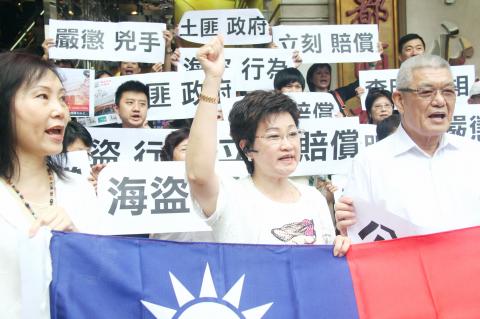Money sent by the Chinese community in the Philippines to the family of the Taiwanese fisherman who was killed by Philippine Coast Guard personnel earlier this month was refused by the victim’s family and the money was instead donated to the National Fishermen’s Association’s maritime relief fund to provide for families of victims of other maritime incidents.
On Wednesday, Friends of the Philippines Foundation chairman Jose Kho (許明良) and other people in the Philippines donated NT$5 million (US$172,900) to the families of Hung Shih-cheng (洪石成) — who was shot dead on May 9 after his boat was strafed by a Philippine Coast Guard vessel — and Chen An-lao (陳安老), who was shot dead while his 62-year-old brother, Chen Ming-te (陳明德), was badly wounded in an incident in 2006.
Chen’s widow, Chen Cheng Wen-tzu (陳鄭文子), expressed her gratitude for the NT$2.5 million donation, saying it was the largest amount given to the family since the death of her husband.

Photo: CNA
Chen’s daughter, Chen Hsing-lan (陳幸蘭), said her family suffered a heavy financial blow from the death of her father and the severe injury to her uncle in the 2006 incident, adding that they did not receive any assistance from the government except for NT$50,000 as a condolence payment.
Two Philippine police officers who were charged with the murder of Chen An-lao seven years ago have failed to report to court in Taiwan to stand trial. They are to remain on the wanted list of the Taitung District Court until 2044.
Meanwhile, Hung’s family declined to accept the donation, saying all they want is an official apology from the Philippine government.
“We are thankful that society has kept us in mind, but such concern would be put to better use helping those who need it,” Hung’s niece Hung Feng-hui (洪鳳慧) said, adding that the family only wants justice.
Meanwhile, Kho said he was very grateful to Taiwanese as he had been on the receiving end of aid when his ship was caught in a typhoon out at sea five years ago.
Kho, whose foundation comprises more than 30 overseas Chinese businessmen operating in the Philippines, said he started the fundraising effort when he heard of the incident concerning Hung.

The first global hotel Keys Selection by the Michelin Guide includes four hotels in Taiwan, Michelin announced yesterday. All four received the “Michelin One Key,” indicating guests are to experience a “very special stay” at any of the locations as the establishments are “a true gem with personality. Service always goes the extra mile, and the hotel provides much more than others in its price range.” Of the four hotels, three are located in Taipei and one in Taichung. In Taipei, the One Key accolades were awarded to the Capella Taipei, Kimpton Da An Taipei and Mandarin Oriental Taipei. Capella Taipei was described by

EVA Airways today confirmed the death of a flight attendant on Saturday upon their return to Taiwan and said an internal investigation has been launched, as criticism mounted over a social media post accusing the airline of failing to offer sufficient employee protections. According to the post, the flight attendant complained of feeling sick on board a flight, but was unable to take sick leave or access medical care. The crew member allegedly did not receive assistance from the chief purser, who failed to heed their requests for medical attention or call an ambulance once the flight landed, the post said. As sick

Minister of Economic Affairs Kung Ming-hsin (龔明鑫) yesterday said that private-sector refiners are willing to stop buying Russian naphtha should the EU ask them to, after a group of non-governmental organizations, including the Centre for Research on Energy and Clean Air (CREA), criticized the nation’s continued business with the country. While Taiwan joined the US and its Western allies in putting broad sanctions on Russia after it invaded Ukraine in 2022, it did not explicitly ban imports of naphtha, a major hard-currency earner for Russia. While state-owned firms stopped importing Russian oil in 2023, there is no restriction on private companies to

INDUSTRY: Beijing’s latest export measures go beyond targeting the US and would likely affect any country that uses Chinese rare earths or related tech, an academic said Taiwanese industries could face significant disruption from China’s newly tightened export controls on rare earth elements, as much of Taiwan’s supply indirectly depends on Chinese materials processed in Japan, a local expert said yesterday. Kristy Hsu (徐遵慈), director of the Taiwan ASEAN Studies Center at the Chung-Hua Institution for Economic Research, said that China’s latest export measures go far beyond targeting the US and would likely affect any country that uses Chinese rare earths or related technologies. With Japan and Southeast Asian countries among those expected to be hit, Taiwan could feel the impact through its reliance on Japanese-made semi-finished products and